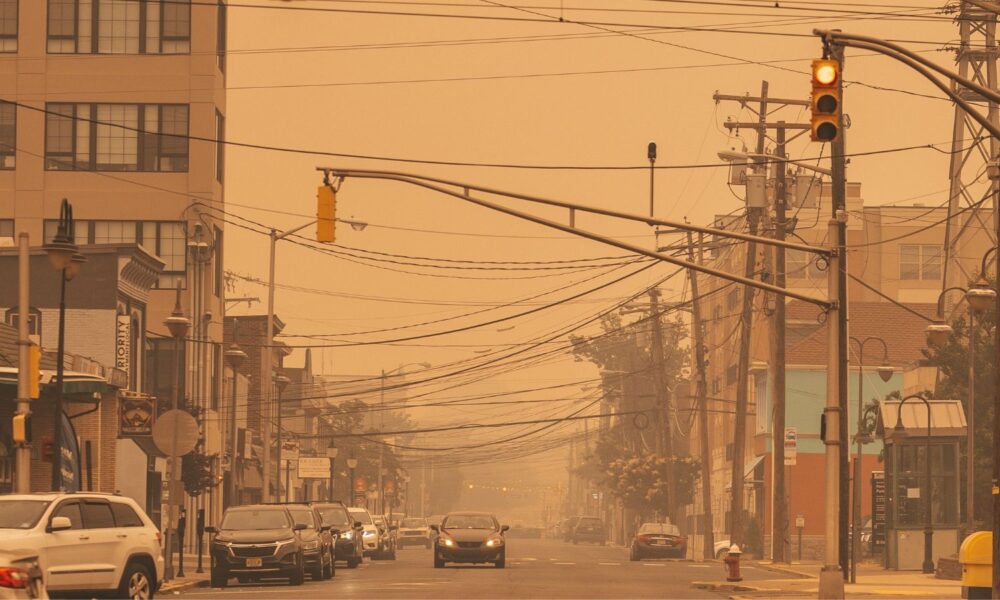“Excuse me, what did they say?”
I don’t speak German, so I leaned over and asked my neighbor if he could translate the announcement that just played over the train’s PA system. His response, in short, was that we weren’t going anywhere for some time. Unfortunately, an expected four-hour train ride between Berlin and Munich ended up taking closer to eight last summer, as the German transit infrastructure experienced systematic failures during an unprecedented heatwave. Computers malfunctioned, equipment melted, and passengers could do little to cope with the increasingly warming train cars that lacked air conditioning. The temperature was 30 degrees (Fahrenheit) warmer than average—and it lasted for days.
As my wife and I continued traveling around Europe on our honeymoon, we were able to experience, firsthand, an historic heatwave that shattered previous records, causing over 60,000 deaths across the continent, and in the UK, resulting in the London Fire Brigade having their busiest day since the Nazi Blitz of World War II.
The urgency of implementing change now
For decades, scientists have been warning about the upcoming dangers of climate change; however, all we have to do today is look around to see the current impacts. Raging forest fires, destructive mudslides, and unprecedented drought—all facets hard to escape from even if desired. It would be easy to ruminate in existential dread; however, I would argue this is the perfect time to rally for an offensive attack. This fight won’t be simple, despite the ever-growing plethora of data. However, there is no better time than now to act!
Continuing our current path is not going to be effective in encouraging the change we need. Over the next five years, the temperatures will continue to rise, and we will violate the original goals set in the Paris Climate Accords. To generate the change needed to lessen the impact of climate change, we need to increase troops to our cause, convincing those who either are not currently fighting this fight, or have been actively been opposing it, downplaying the role of human behavior on the climate. Further, to implement systematic change, we also need to get politicians onboard. This two-front approach—changing the minds of voters and politicians—requires all of us, whether we are a scientist or not, to rework of our action plan. We need to change how we respond to the increasingly dire news, and we need to change how we attempt to win over support. A two-front approach requires a two-front solution.
Changing how we respond to the message
It is simply impossible to keep up with the environmental crises that are occurring internationally, and any attempt to remain at least somewhat informed may leave us in a vulnerable state. Climate anxiety—or the emotional distress stemming from climate change, including sensations of anxiety, anger, and/or guilt—is prevalent both within children and adults; however, it does not necessarily predict one’s likelihood to act out in support of pro-environmental change. While anxiety can be a motivator, too much can leave us feeling hopeless and helpless.
Therefore, instead of being left feeling lost by the torrent of news stories, I propose we start by utilizing cognitive reframing—a technique from cognitive behavioral therapy (CBT). Instead of focusing solely on the loss, acknowledge the loss AND identify ways to move forward with it. While the news is draining, recognize that the surplus of climate-related news stories indicates people are talking and an audience exists. None of us are fighting this fight alone. The situation is drastic, AND there are many of us here wanting to enact change. Just sticking with negative talking points will burden us. It will also impede people from joining in on this fight, and discourage those who have already agreed to join us. We can see the dire situations, AND now we ask, “What’s next?”
In addition to reframing our observations, self-validation is also vital in ensuring our own well-being as we fight this fight. We face an extraordinary task, one that feels daunting and draining. However, we must remind ourselves that we need to fight to raise support and implement change because our work is something called a “superordinate goal.” First described by social psychologist Muzafer Sherif in the 1950s, he used the term to describe tasks that require opposing sides to work together to reach a common goal. He found even when bitter rivalries arose, collaboration and reconciliation were possible when both sides were able to conceptualize an issue as a common goal. In applying this concept to climate change, we may be able to overcome even harsh political tension, conflict, and opposition, and move towards collaboration, if we can reframe the message in a way that is appealing to everyone. And if we can readjust the messaging, then we will be capable of implementing significant change. No matter the degree of conflict, if everyone can find value, and collaborate, then hope and change can arise.
Changing how we communicate the message
While scientists have been sounding the alarms for decades on the current climate crisis, the tendency for scientists to rely on data-focused conversations to foster change is faulted, resulting in backlash and running the risk of isolating large pockets of individuals. So how do we instigate such change then? All of us—regardless of our professional identities—need to change how we are speaking about climate, and be less scientific in our messaging. Instead, we must make it clear to our audience why this is such an important issue for them.
How can we demonstrate that their joining in on this cause will benefit them? Personalize the message! Share your own stories and struggles, as I have done above, and communicate to the audience why their concern is tied with your own. While the phrase “climate change” may spark controversy and disgust in some circles, we can instead focus on “extreme weather events,” and target local concerns. For example, to encourage change in Florida, we can note something needs to be done to help decrease the prices of home insurance. To encourage change in Montana, let’s note that one of the biggest tourism draws to the state, the majestic glaciers, will soon be gone without intervention. Or, we could note that parts of Utah will soon start experiencing episodes of poisonous arsenic-laced air as the Great Salt Lake dries.
In an effort to avoid sounding completely pessimistic, however, our messages should also inspire hope of what kind of change is possible. Our message should highlight the valued gains people can expect from climate-focused policies. For example, for animal lovers, share how years of cleaning the waterways and air in and around New York City has resulted in the return of marine and avian species to the city, from the dolphin to the bald eagle. Or, for fans of outdoor activities, describe to them how the Cuyahoga River, which runs through downtown Cleveland, was once so polluted that it caught fire—not once, but over 10 times—and is now considered the best urban kayaking experience in the country, thanks to significant local efforts. Making the conversation local makes it real. Making the conversation local allows us to define realistic targets and potential action steps.
In addition to customizing our message to the audience, we also need to ensure our call to action remains consistent and persistent: continued communication despite whatever obstacles and pushback we receive. In the United States at least, scientists do not typically get political and science does not always take precedence, despite its importance. Scientific messaging often remains in the shadows. With the first-ever March for Science in 2017, and then in 2020, during the initial wave of the COVID-19 pandemic, science took precedence; however, the emphasis on science quickly faded. This is not to say that all of us must engage in scientific communication—which is known to turn people away quickly. However, we must consistently educate ourselves, grow our knowledge and understanding, and be quick to combat disinformation, all while avoiding the pitfalls of sounding pretentious or criticizing our audience. We must remain vigilant and approachable!
As the impact of climate change becomes more unavoidable, we must be ready to present with answers, communicate with neighbors, and demonstrate that we have the facts to describe what is happening, all to stimulate conversations towards notable change. Now, more than ever, to assist with this mission, we need to remember that we are not alone in this cause. We have allies who are informed and motivated for change. We must remember that despite feelings of hopelessness, and numerous barriers we will continue to face in encouraging systematic change, including the financial incentives of denying change, if we are able to personalize our message for each audience, and remain persistent, we can generate collaborative efforts from citizens and politicians alike to create the systematic change that is needed to combat the greatest threat to humanity. For that is no hyperbole.

